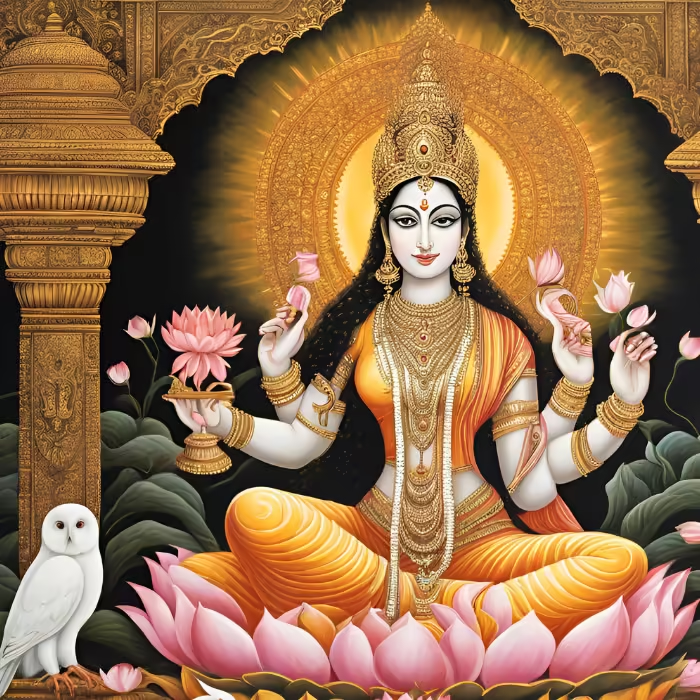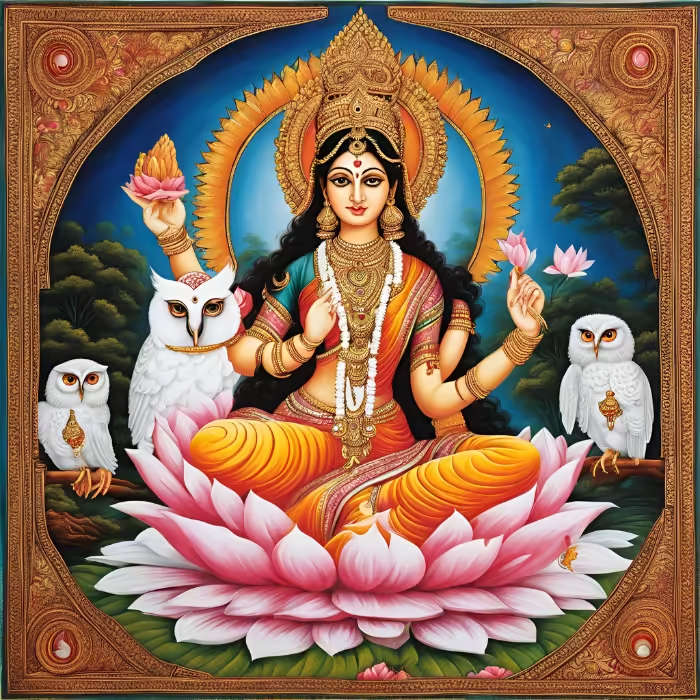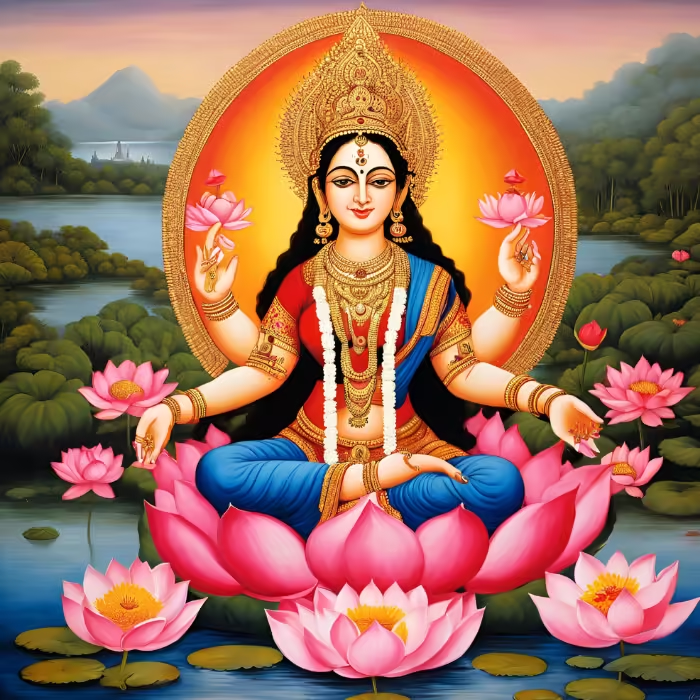Kojagori Lakshmi Puja: Rituals, Significance, and Celebration
Introduction
Kojagori Lakshmi Puja, also known as Kojagori Lokkhi Puja, is a revered Hindu festival that is widely celebrated in the states of West Bengal, Odisha, Assam, and other parts of eastern India. The festival is dedicated to Goddess Lakshmi, the Hindu deity of wealth, prosperity, and fertility.
It falls on the full moon night (Purnima) of the month of Ashwin according to the Hindu lunar calendar, which usually occurs in September or October. The word “Kojagori” is derived from the Bengali phrase “Ke Jago Re” or “Who is awake?”—a question posed by Goddess Lakshmi herself. Devotees believe that on this auspicious night, the Goddess descends from the heavens to bless those who remain awake, worship her, and pray for her blessings.
The Kojagori Lakshmi Puja is a festival of lights, joy, and prosperity. The rituals associated with this puja are elaborate and deeply symbolic, and they embody the cultural richness of the regions where the festival is celebrated. This festival also carries a strong social and economic significance, marking a period of prosperity and well-being in communities.
In this article, we will explore the various rituals, cultural significance, and the spiritual essence of Kojagori Lakshmi Puja, along with the myths and legends associated with the celebration.
The Origin and Mythology of Kojagori Lakshmi Puja
Kojagori Lakshmi Puja has its roots in ancient Hindu mythology. The story most commonly associated with the festival revolves around the question, “Ke Jago Re?”—or “Who is awake?” According to this legend, Goddess Lakshmi wanders the Earth on the night of Ashwin Purnima to see which of her devotees are awake and worshipping her. Those who remain awake and engage in prayer and devotion are blessed with her divine grace, ensuring prosperity and happiness in their lives.
One popular myth behind the celebration of this puja tells the story of a king who had lost all his wealth due to misfortune. His queen, however, remained steadfast in her faith and devotion to Goddess Lakshmi. On the night of Kojagori Purnima, she observed the rituals of Lakshmi Puja with great devotion and remained awake throughout the night. Moved by her devotion, Goddess Lakshmi visited the queen and restored the prosperity of the kingdom. This story underscores the belief that Kojagori Lakshmi Puja is not just about material wealth, but also about spiritual fulfillment and divine grace.
Another legend links Kojagori Lakshmi Puja to the Samudra Manthan (the churning of the ocean) episode from Hindu mythology. During the churning of the ocean by the gods (Devas) and demons (Asuras), many divine treasures emerged from the ocean, including Goddess Lakshmi. The day she emerged is considered highly auspicious, and it is believed that worshipping her on this day brings divine blessings in the form of wealth and prosperity.
Rituals of Kojagori Lakshmi Puja
The rituals of Kojagori Lakshmi Puja are elaborate and filled with deep symbolic meaning. Each step of the puja is believed to invoke the presence of Goddess Lakshmi and is performed with great care and devotion.
1. Cleaning and Decorating the Home
The first step in preparing for Kojagori Lakshmi Puja is to thoroughly clean the house. It is believed that Goddess Lakshmi visits only clean and well-maintained homes, as cleanliness symbolizes purity. Houses are often decorated with colorful rangoli designs (known as Alpana in Bengali) made from rice flour, which are believed to welcome the Goddess. One common motif in the Alpana is the footprint of Goddess Lakshmi, symbolizing her arrival into the home.
Oil lamps or diyas are placed in various parts of the house, especially near the altar where the puja will be performed. Lighting lamps is a symbolic gesture to remove darkness and ignorance and to invite the light of prosperity and wisdom into the home.
2. Setting Up the Altar for Lakshmi
The next step involves setting up an altar dedicated to Goddess Lakshmi. A clean space is chosen, and an image or idol of the Goddess, adorned with flowers, is placed at the center of the altar. Offerings such as fruits, sweets (especially coconut sweets like naru), puffed rice, and other traditional items are arranged around the idol.
A pot filled with water (Kalash) is placed near the altar, representing the presence of divine energy. A small mango or betel leaf is placed over the pot, and a coconut is placed on top. The Kalash symbolizes abundance and fertility.
3. Performing the Puja (Worship)
The actual puja begins with invoking Lord Ganesha, the remover of obstacles, who is worshipped at the beginning of any auspicious occasion. After Ganesha, the worship of Goddess Lakshmi begins. The priest or the head of the family performs the puja by reciting mantras, offering flowers, lighting incense, and making offerings of food, water, and sweets to the Goddess.
Special attention is given to the lighting of oil lamps, as they symbolize the dispelling of darkness. Devotees believe that the light of the lamps guides Goddess Lakshmi into their homes, ensuring prosperity and happiness.
The chanting of Lakshmi mantras and hymns, such as the “Sri Sukta,” is an integral part of the ritual. These chants are believed to invoke the presence of the Goddess and are recited with devotion to attract her blessings.
During Kojagori Lakshmi Puja, several mantras are chanted to invoke the blessings of Goddess Lakshmi. These mantras are believed to bring prosperity, wealth, and peace to the devotees. Below are some of the most commonly recited mantras for Kojagori Lakshmi Puja:
1. Lakshmi Gayatri Mantra
The Lakshmi Gayatri Mantra is one of the most powerful mantras for invoking the blessings of Goddess Lakshmi. It is believed to enhance spiritual energy and bring prosperity to life.
Mantra:
ॐ महालक्ष्म्यै च विद्महे विष्णुपत्नी च धीमहि ।
तन्नो लक्ष्मीः प्रचोदयात् ॥
Transliteration:
Om Mahalakshmyai Cha Vidmahe Vishnupatni Cha Dhimahi
Tanno Lakshmih Prachodayat
Meaning: “We meditate on the great Goddess Lakshmi, the consort of Lord Vishnu. May she illuminate our intellect and guide us toward prosperity and wisdom.”
2. Shri Lakshmi Mantra
This mantra is simple and effective for invoking Goddess Lakshmi and seeking her blessings for wealth and prosperity.
Mantra:
ॐ श्रीं महालक्ष्म्यै नमः ॥
Transliteration:
Om Shreem Mahalakshmyai Namah
Meaning: “Salutations to Goddess Mahalakshmi, the embodiment of prosperity.”
3. Mahalakshmi Ashtakam
This is a popular stotra dedicated to Goddess Lakshmi, consisting of eight verses. It is chanted to praise the Goddess and seek her blessings for wealth, health, and happiness.
Verse 1:
नमस्तेऽस्तु महा माये श्री पीठे सुर पूजिते ।
शङ्ख चक्र गदा हस्ते महा लक्ष्मि नमोऽस्तु ते ॥
Transliteration:
Namastestu Maha Maaye Shree Pithe Sura Poojite
Shankha Chakra Gada Haste Maha Lakshmi Namostute
Meaning: “Salutations to you, O Great Goddess Mahalakshmi, who is worshipped by the gods and resides on the Lotus seat. You hold the conch, discus, and mace in your hands. O Mahalakshmi, I bow to you.”
4. Shri Sukta
The Shri Sukta is a powerful hymn dedicated to Goddess Lakshmi. It is part of the Rigveda and is considered one of the most potent invocations for prosperity, wealth, and peace. Chanting the Shri Sukta during Kojagori Lakshmi Puja is believed to bring material and spiritual blessings.
A few important verses from Shri Sukta:
ॐ हिरण्यवर्णां हरिणीं सुवर्णरजतस्रजाम्।
चन्द्रां हिरण्मयीं लक्ष्मीं जातवेदो म आवह ॥
Transliteration:
Om Hiranyavarnaam Harineem Suvarnarajatasrajam
Chandraam Hiranmayeem Lakshmeem Jatavedo Ma Avaha
Meaning: “O Jatavedas (Fire God), please invoke for me Goddess Lakshmi, who is golden-hued, resplendent like gold and silver, adorned with ornaments, and radiant like the moon.”
5. Lakshmi Beej Mantra
This mantra is a very powerful and concise way to invoke the presence of Goddess Lakshmi. It focuses on the bija (seed) sound “Shreem,” which represents abundance and prosperity.
Mantra:
ॐ श्रीं ह्रीं श्रीं कमले कमलालये प्रसीद प्रसीद
ॐ श्रीं ह्रीं श्रीं महालक्ष्म्यै नमः ॥
Transliteration:
Om Shreem Hreem Shreem Kamale Kamalalaye Praseeda Praseeda
Om Shreem Hreem Shreem Mahalakshmyai Namah
Meaning: “Salutations to Goddess Lakshmi, who resides in the lotus and is adorned with lotuses. Please be gracious and shower your blessings on me.”
6. Dhanadayak Lakshmi Mantra
This mantra is specifically chanted to seek material wealth and prosperity from Goddess Lakshmi.
Mantra:
ॐ ह्रीं श्रीं क्लीं धनदायै नमः ॥
Transliteration:
Om Hreem Shreem Kleem Dhanadaayai Namah
Meaning: “Salutations to the Goddess who bestows wealth and prosperity.”
7. Kanakadhara Stotra
The Kanakadhara Stotra is a hymn composed by Adi Shankaracharya to invoke the blessings of Goddess Lakshmi. It is believed that chanting this stotra brings an abundance of wealth and removes poverty.
Here is the first verse of the Kanakadhara Stotra:
अङ्गं हरे: पुलकभूषणमाश्रयन्ति
भृङ्गाङ्गनेव मुकुलाभरणं तमालम् ।
अङ्गीकृताखिलविभूतिरपाङ्गलीला
माङ्गल्यदाऽस्तु मम मङ्गलदेवतायाः ॥
Transliteration:
Angam Hareh Pulaka-Bhuushhanam-Aashrayanti
Bhrngga-Anganeva Mukula-Abharnnam Tamaalam |
Angiikrt-Akhila-Vibhuutir-Apaangga-Liilaa
Maanggalya-Daa[a-A]stu Mama Manggala-Devataayaah ||Meaning: “May the beautiful glance of Goddess Lakshmi, which embraces all the bounties and bestows auspiciousness, always protect and bless me.”
How to Chant the Mantras:
- Preparation: Ensure that you have a clean and quiet space for chanting. Sit in a comfortable position facing east.
- Focus: Before starting, calm your mind and focus on Goddess Lakshmi’s image or idol. Light a diya (lamp) and offer flowers or sweets.
- Devotion: Chant the mantras with devotion, a clear pronunciation, and a heart full of reverence. You can use a rosary (mala) to count the number of repetitions.
- Consistency: Chanting these mantras daily or on auspicious days like Kojagori Lakshmi Puja can bring about powerful spiritual and material benefits.
These mantras are designed to invoke the blessings of Goddess Lakshmi and attract abundance, peace, and spiritual well-being.
4. Staying Awake Throughout the Night
One of the unique aspects of Kojagori Lakshmi Puja is the tradition of staying awake throughout the night. This practice stems from the belief that Goddess Lakshmi visits the homes of those who are awake and devoted on this night. To ensure that they remain awake, devotees engage in various activities such as singing devotional songs, reciting prayers, and participating in cultural performances.
In many households, people gather to perform aarti (a ceremonial offering of light) late into the night, reinforcing their devotion and ensuring that they do not fall asleep before receiving the blessings of the Goddess.
5. Offering Prasad
At the end of the puja, the offerings made to Goddess Lakshmi, known as prasad, are distributed among family members and neighbors. This prasad, which includes sweets, fruits, and other food items, is considered highly auspicious and is believed to carry the blessings of the Goddess.
6. Immersion of the Kalash
In some regions, the Kalash used during the puja is later immersed in a nearby river or pond, symbolizing the return of the Goddess to her divine abode. This immersion also marks the end of the puja rituals.
The Cultural and Social Significance of Kojagori Lakshmi Puja
Kojagori Lakshmi Puja is not just a religious celebration but also a cultural event that brings communities together. The festival fosters a sense of unity and shared purpose as people come together to worship the Goddess and seek her blessings for collective well-being.
1. Festival of Prosperity
At its core, Kojagori Lakshmi Puja is a festival that celebrates prosperity in all its forms—material, spiritual, and emotional. Goddess Lakshmi is revered not just as the provider of wealth but also as the embodiment of fertility, purity, and wisdom. By worshipping her, devotees seek blessings for a prosperous life filled with abundance, peace, and happiness.
In agricultural communities, the festival is particularly significant as it coincides with the end of the monsoon season and the beginning of the harvest. Farmers pray to Goddess Lakshmi for a bountiful harvest and express their gratitude for the fertility of the land.
2. Role of Women
Kojagori Lakshmi Puja holds special significance for women, particularly in Bengal. It is believed that the well-being and prosperity of the household depend largely on the devotion and care of the women of the family. Women, therefore, take an active role in cleaning and decorating the house, preparing the prasad, and performing the rituals of the puja.
The festival also emphasizes the role of women as nurturers and providers, symbolizing the Goddess Lakshmi herself, who is seen as the source of prosperity and abundance in the family.
3. Community Participation
In addition to individual household celebrations, Kojagori Lakshmi Puja is often observed as a community festival, especially in rural areas. Neighbors come together to organize communal pujas, build large pandals (temporary shrines), and host cultural performances such as dance, music, and drama.
These communal celebrations strengthen social bonds and foster a sense of collective identity and shared prosperity. In many towns and villages, people of all ages gather to participate in the festivities, contributing to the overall spirit of joy and togetherness that marks the occasion.
The Spiritual Essence of Kojagori Lakshmi Puja
While the outward rituals of Kojagori Lakshmi Puja focus on material wealth and prosperity, the deeper spiritual significance of the festival lies in the quest for inner wealth—spiritual growth, contentment, and wisdom.
1. Lakshmi as the Embodiment of Shakti
Goddess Lakshmi is regarded as a manifestation of Shakti, the divine feminine energy that sustains the universe. In her role as the goddess of wealth, Lakshmi not only provides material abundance but also represents the spiritual wealth of knowledge, virtue, and wisdom.
The Kojagori Lakshmi Puja is thus an opportunity for devotees to reflect on the importance of balance in life—between material pursuits and spiritual fulfillment. True prosperity, according to Hindu belief, comes not just from wealth but from the cultivation of good qualities, kindness, and wisdom.
2. The Power of Devotion
The rituals of Kojagori Lakshmi Puja emphasize the importance of devotion, purity, and discipline. Staying awake throughout the night is symbolic of the spiritual vigilance required to achieve success and prosperity. Just as devotees remain alert and focused on the night of the puja, they are reminded to stay vigilant in their spiritual lives, avoiding complacency and laziness.
The festival encourages devotees to practice self-discipline, patience, and devotion to the divine, qualities that are essential for achieving both material and spiritual prosperity.
3. Gratitude and Contentment
Kojagori Lakshmi Puja also serves as a reminder of the importance of gratitude. By offering prayers and making offerings to Goddess Lakshmi, devotees express their gratitude for the blessings they have received and seek her continued grace in the future.
The festival encourages contentment and humility, reminding devotees that true wealth lies not in hoarding material possessions but in sharing one’s blessings with others and cultivating a spirit of generosity.
Conclusion
Kojagori Lakshmi Puja is a festival that beautifully weaves together the threads of devotion, culture, and community. The rituals performed during the puja are not just acts of worship but also symbolic gestures that reflect the deeper spiritual values of Hinduism—gratitude, devotion, balance, and the pursuit of inner wealth.
As devotees light lamps, sing prayers, and stay awake on the night of Ashwin Purnima, they are not only invoking the blessings of Goddess Lakshmi but also reinforcing their commitment to leading lives of virtue, contentment, and wisdom. The festival is a reminder that true prosperity encompasses not just material wealth but also spiritual growth, inner peace, and the well-being of the entire community.
In a world often preoccupied with material success, Kojagori Lakshmi Puja invites us to pause and reflect on the deeper meaning of wealth and abundance, reminding us that prosperity, in its truest sense, is a gift of both the heart and the soul.
Stay tuned for laxmi puja special recipe (prasadam)…